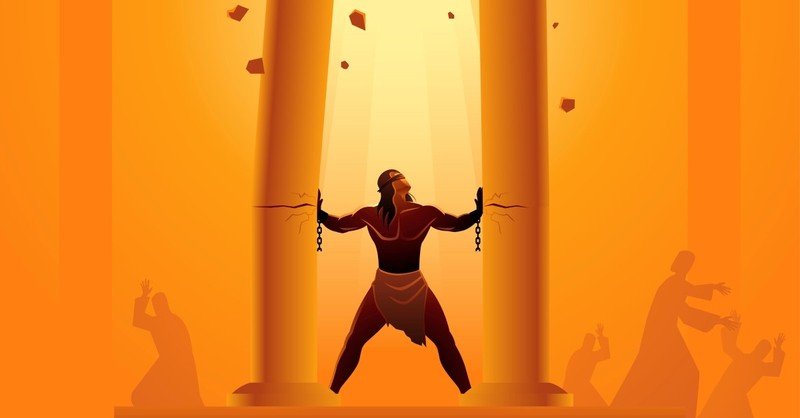
People are, in their flesh, selfish creatures. They look out for their own interests first and foremost. But the Creator is the God of love and of giving. He gave life, purpose, and ultimately a path for people separated from Him to have a relationship with Him through a sacrifice. When people model sacrifice, it is inspirational, as they begin to behave less like sinners and more like God.
The Bible is full of stories of courage, of repentance, and of people making sacrifices, many of which point toward the greatest sacrifice of all – the one that changed the world.
Studying a variety of different kinds of sacrifices helps us understand the nature of surrendering what we want for the sake of other. This can illuminate the complexities of human nature, and the power of transformation brought on by the love of God.
Here are eight powerful stories of sacrifice from the Bible.
Photo credit: ©Getty Images/Wenping-Zheng

1. Abraham and Isaac
Abraham did not grow up knowing the one true God, but he came to know Him in a deep and personal way. He had conversations with the Lord, hosted angelic beings in His home, and made a covenant with God.
Despite all these events, Abraham didn’t have a son of his own. Through the miraculous workings of the Lord, Abraham had a son by his wife Sarah when he was 100 years old and she was 90. This son, named Isaac, was their pride and joy. But his birth came after Abraham disobeyed God by having an illegitimate son by Sarah’s concubine, Hagar.
God made a new covenant, one that required obedience from Abraham. To test that resolve, God asked Abraham to do the impossible, “Take your son, your only son Isaac, whom you love, and go to the land of Moriah, and offer him there as a burnt offering on one of the mountains of which I shall tell you” (Genesis 22:2b). Despite his love for Isaac, Abraham did as he was asked.
It can be difficult to understand why Abraham would do such a thing, but the writer of the Book of Hebrews clarified, “He considered that God was able even to raise him from the dead, from which, figuratively speaking, he did receive him back” (Hebrews 11:19).
God stayed Abraham’s hand, and a ram was offered up in Isaac’s place, but the powerful faith of Abraham is moving. Even though he had never seen anybody raised from the dead, and it had not happened until that point in history, Abraham believed that God could and would raise his son from the dead.
Photo credit: ©Getty Images/rudall30

2. Ruth Sacrificed for Naomi
When Ruth the Moabitess married the foreigner Mahlon, she could not foresee the difficulties awaiting her. Her husband’s family was from the land of Israel, fleeing a famine. His father had just recently died, and not long after, he and his brother died.
Ruth was a young widow, and she faced two choices. She could either stay where it was comfortable and go back to live with her parents, where she could stay in her own culture and follow her own gods. Or she could lay down everything she knew at the altar of the God of her new family, and take care of her widowed mother-in-law Naomi, who actually encouraged her to return to her family.
Ruth decided to take the dangerous journey back to Bethlehem, Naomi’s home, and give up everything she knew. She believed in the God of Israel, stating, “Do not urge me to leave you or to return from following you. For where you go, I will go, and where you lodge, I will lodge. Your people shall be my people, and your God my God. Where you die I will die, and there will I be buried. May the Lord do so to me and more also if anything but death parts me from you” (Ruth 1:16-17).
When they first arrived in Israel, her life did not get better. She sacrificed by doing hard labor gleaning in the fields, risking her own safety in the process. But God graciously led her to the field of Boaz, and through that relationship He blessed both women, rewarding Ruth’s sacrifices.
Photo credit: Pexels/Bruno Cervera

3. Samson Sacrifices Himself
The period of the Judges – after the Hebrews settled Israel but before there was a king – was full of chaos. God would raise up powerful men and women to bring order, but sin ran rampant, even among the great men.
Samson was one such man, blessed through a Nazarite vow with incredible strength to defeat the enemies of the living God. While he would do battle against the Philistines on occasion, he famously broke the conditions of his vows repeatedly; he married a foreign woman whom he allowed to be abused at the hands of others, and he had a sexual relationship outside of marriage to the Philistine woman Delilah. He led a life that was very different from the one he should have if he took his relationship with God seriously.
Eventually, his pride and sin caught up with him, and the Philistines took him prisoner, gouged out his eyes, forced him to do hard labor, and made a mockery of him. At the end of his life, in humility, Samson cried out to God for one more ounce of strength. He had the opportunity to destroy the great and powerful rulers of Israel’s enemy, the Philistines, and sacrificed his own life.
“And Samson grasped the two middle pillars on which the house rested, and he leaned his weight against them, his right hand on the one and his left hand on the other…Then he bowed with all his strength, and the house fell upon the lords and upon all the people who were in it. So the dead whom he killed at his death were more than those whom he had killed during his life” (Judges 16:29, 31).
While one great sacrifice did not erase a life of debauchery, it did give Samson an opportunity to get right with God before his death.
Photo credit: ©Getty Images/rudall30

4. David Sacrifices Uriah
While it is inspirational to read about sacrifices of love and obedience, not every powerful story of sacrifice is one person laying down their life for a greater cause. Sometimes someone who is selfish is willing to sacrifice someone else to fulfill their own desires.
David was a man after God’s own heart, but he was just a man. When he saw a beautiful, but married woman, he coveted her and took her into his bed. To make things worse, she was the wife of one of his most trusted generals, a Hittite named Uriah – a man who left his false gods to follow the true God and serve the King of Israel.
Despite the sacrifices Uriah made for David, to hide his own evil and to get what he wanted, David sacrificed Uriah.
“In the morning David wrote a letter to Joab and sent it by the hand of Uriah. In the letter he wrote, ‘Set Uriah in the forefront of the hardest fighting, and then draw back from him, that he may be struck down, and die.’ And as Joab was besieging the city…the men of the city came out and fought with Joab, and some of the servants of David among the people fell. Uriah the Hittite also died” (2 Samuel 11:14-18).
The rest of David’s reign was plagued with the consequences of this fateful, evil sacrifice.
Photo credit: Unsplash/Hasan Almasi

5. Elijah’s Sacrifice to God after Failed Sacrifices to Baal
God instituted the sacrificial system as a way to demonstrate that no man could earn salvation, and to be a temporary way of facilitating repentance until He resolved the issue of sin and death once and for all, in His time. However, other false religions also had sacrificial systems, some of which included human sacrifice.
During the reigns of wicked kings in Israel and Judah, sacrifice to false gods would be common. Ahab was king of Israel. He married a Phoenician who brought her worship of the false god Baal with her, along with the evil practices. One of the few prophets of the true God to stand up to her publicly was Elijah. In a moment of great faith, he challenged all 450 prophets of Baal to conduct sacrifices in the name of their god, and he would do the same in the name of his God.
The prophets of Baal tried for hours to call down fire from heaven, lashing themselves, dancing wildly, and wearing themselves out. Nothing happened. Elijah, meanwhile, drenched his altar in water, crying out, “‘Answer me, O Lord, answer me, that this people may know that you, O Lord, are God, and that you have turned their hearts back.’ Then the fire of the Lord fell and consumed the burnt offering and the wood and the stones and the dust, and licked up the water that was in the trench. And when all the people saw it, they fell on their faces and said, ‘The Lord, he is God; the Lord, he is God’” (1 Kings 18:37-39).
That one sacrifice was enough to turn many away from false gods, rebel against the evil prophets, and to return to the true God.
Photo credit: ©Getty Images/Nonnie192

6. Mary and Joseph’s Sacrifices
Matthew 1:18-23 and Luke 1:26-56
Parents always make sacrifices for their children, and the parents of the Lord Jesus were no exception. While the Bible is relatively silent on the sacrifices they made, there are hints and glimpses at a life of pain, judgment, and hardship.
Neither Joseph nor Mary were particularly wealthy individuals, though they were both descendants of David. They also had a baby to care for right when their marriage first started – they didn’t even have the benefit of time to adjust and learn how to be married without caring for children. At best, they would have suffered the judgment of people believing they had had sex before they were formally married. At worst, Mary would have been branded a prostitute and Joseph mocked for marrying a woman he knew slept with another man.
Despite knowing all of this ahead of time, they obeyed God, and loved one another through the difficulties, with Mary declaring, “For behold, from now on all generations will call me blessed” (Luke 1:48b).
Photo credit: ©Getty Images/RomoloTavani

7. The Sacrifice of the Widow’s Mite
By the time Jesus entered into the world, there was a great deal of corruption going on in the temple. One of the biggest problems was people used the Temple as an opportunity to flaunt their wealth; they gave in order to be seen, rather than as part of giving back to God because of a loving relationship with Him.
During His ministry, Jesus witnessed a widow giving two copper coins into the offering box. Widows at this time generally were poor, alone, and needed support from the community. Jesus actually clarifies the mite she gave was all she had. Her offering was a great sacrifice; the Lord said, “Truly, I say to you, this poor widow has put in more than all those who are contributing to the offering box” (Mark 12:43b).
Because she gave sincerely, with faith and love for God, her sacrifice meant more to the Lord than the other offerings, and she will be more greatly rewarded in the Kingdom of God.
Photo credit: Unsplash/Jordan Rowland

8. Jesus’ Sacrifice on the Cross
“For the life of the flesh is in the blood, and I have given it for you on the altar to make atonement for your souls, for it is the blood that makes atonement by the life” (Leviticus 17:11).
These words from the Levitical Law guided the life of the Israelites, and anyone else who followed the living God, for centuries. Only blood can atone for sin. Yet under the Law, no one could fully atone for their sins, having to return to the Temple over and over again.
To take care of the issue of sin and atonement once and for all time, God had a plan. God the Son, Jesus Christ, came down and took physical form, and lived a life without sin. Because of His righteousness, His death could pay for the sins of all others.
He died on a cross, suffering tremendous pain and torture. He was beaten, abused, humiliated, and mocked. God the Father, unable to be in the presence of sin, turned His face away from Jesus while He hung on that cross. Through this act of sacrifice, Jesus made it possible for all people to repent once, to be forgiven, and to have an eternal relationship with God. It was a great victory, and three days later, He won another one by rising bodily from the dead, conquering sin, death, and the grave for all time.
Before His death, Jesus said these encouraging words, “I have said these things to you, that in me you may have peace. In the world you will have tribulation. But take heart; I have overcome the world” (John 16:33). His sacrifice secured salvation for anyone who will confess with their mouth that Jesus is Lord and believe in their heart that God raised Him from the dead.
When following God, people will have to make sacrifices. Sometimes it will be the hardest thing they will ever do. Because of these examples of Christ-like sacrifices, as well as one or two that show what kind of sacrifices not to make, believers can walk confidently through the difficulties of life, including sacrifices. Faith is the victory given to each believer. Every sorrow will seem small in comparison to having our faith made sight when we enter into the presence of the Lord Jesus and He says, “well done.”
Sources
Hardinge, Leslie. Shadows of His Sacrifice. Brushton: TEACH Services, Inc., 1959
Walvoord, John F. and Roy B. Zuck. The Bible Knowledge Commentary An Exposition of the Scriptures by Dallas Seminary Old Testament and New Testament. United States of America: Victor Books, 1987.
Wilmington, H.L. Wilmington’s Guide to the Bible. Wheaton: Tyndale House Publishers, 1981.
Photo credit: ©Getty Images/artplus
Originally published Thursday, 11 April 2024.





